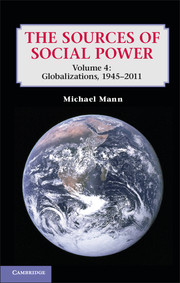Book contents
- Frontmatter
- Contents
- 1 Globalizations
- 2 The postwar global order
- 3 America in war and cold war, 1945–1970
- 4 U.S. civil rights and identity struggles
- 5 American empire during the cold war, 1945–1980
- 6 Neoliberalism, rise and faltering, 1970–2000
- 7 The fall of the Soviet alternative
- 8 The Maoist alternative reformed
- 9 A theory of revolution
- 10 American empire at the turn of the twenty-first century
- 11 Global crisis
- 12 Global crisis
- 13 Conclusion
- Bibliography
- Index
13 - Conclusion
Published online by Cambridge University Press: 05 January 2013
- Frontmatter
- Contents
- 1 Globalizations
- 2 The postwar global order
- 3 America in war and cold war, 1945–1970
- 4 U.S. civil rights and identity struggles
- 5 American empire during the cold war, 1945–1980
- 6 Neoliberalism, rise and faltering, 1970–2000
- 7 The fall of the Soviet alternative
- 8 The Maoist alternative reformed
- 9 A theory of revolution
- 10 American empire at the turn of the twenty-first century
- 11 Global crisis
- 12 Global crisis
- 13 Conclusion
- Bibliography
- Index
Summary
Overall patterns of globalization and development
In this volume I have depicted a narrowing followed by a widening of the ideological spectrum, capitalist triumph and tribulations, the decline of interstate wars and their replacement by either peace or civil wars, the intensification of national citizenship, and the replacement of all empires save one by nation-states. All this was happening on an increasingly global scale – a series of globalizations, which sometimes reinforced, sometimes undercut, and always differed from each other. As a result, the world is more interconnected, though it is not harmonious, and it is nowhere near being a single global system. It is a process of universal but polymorphous globalization.
My second volume identified capitalism and nation-states as the two main power organizations of the long nineteenth century in the advanced countries. In Volume 3 and here I have expanded my horizons to the globe and added empires. The entwined dynamics of capitalism, nation-states, and empires brought disastrous world wars and revolutions in the first half of the twentieth century. This was followed by a fairly sharp break after 1945 as power relations subsided into a short “golden age” of democratic capitalism, in which occurred the collapse of all but two empires, a degree of class compromise within capitalism, the institutionalization of both capitalism and state socialism, the emergence of mass social citizenship, and global economic and population growth. The principal military confrontation eased into a merely cold war, which eased further as the Soviet Union stagnated. This plus the advent of nuclear weapons brought a decline in usable military power and a rapid decline in interstate wars across the world. Reformed capitalism and American-led geopolitics between nation-states now jointly bestrode most of the world. In the North of the world a higher level of civilization, more prosperous, with more public caring, more literacy and greater human longevity was being developed, though the route to it had been circuitous and dangerous. But there was concern in this period that the South of the world was not sharing in much of this and indeed might be condemned to a limited and dependent development.
- Type
- Chapter
- Information
- The Sources of Social Power , pp. 400 - 432Publisher: Cambridge University PressPrint publication year: 2012



